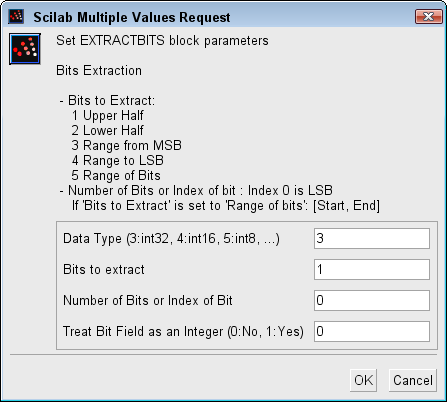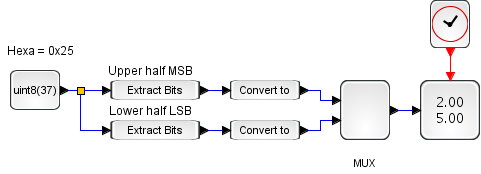Please note that the recommended version of Scilab is 2026.0.1. This page might be outdated.
See the recommended documentation of this function
EXTRACTBITS
Bits Extraction
Block Screenshot

Contents
Palette
Description
For an integer input this block outputs a contiguous selection of bits. The operation can be summarized by this expression:

i.e. a bitwise AND between Input and
Mask an integer of the same length as input with the bits to extract
set to 1 and the other bits set to 0.
Bits to Extract parameter defines the method by which the
user selects the output bits as summarized by the following table with index
0, as that of the least significant bit :
| Bits to Extract | Output | Number of Bits or Index of Bit |
| Upper Half | Half of the input that contain the most significant bit | Ignored |
| Lower Half | Half of the input that contain the least significant bit | Ignored |
| Range from MSB | Number of Bits or Index of Bit bits of the input that contain the most significant bit (MSB) | Number of bits to extract. |
| Range to LSB | Number of Bits or Index of Bit bits of the input that contain the least significant bit (LSB) | Number of bits to extract. |
| Range of bits | Range of bits of the input between the indexes of the bits Start and
End of Number of Bits or Index of Bit parameter. |
Vector with the format [Start, End] where start
the first bit index and end the last bit index. |
The output value depends also on the forth parameter Treat Bit Field as an Integer :
0 : the output is directly the result of extraction.
1 : the output is the integer conversion of the extraction result according to the signed or non-signed status of the input.
Data types
The block supports the following types :
Input : scalar. All Scilab's integer type (Data Type parameter).
Output : same type than input.
Dialog box

Data Type (3:int32, 4:int16, 5:int8, ...)
It indicates the integer type on input: Between 3 and 8.
Properties : Type 'vec' of size 1.
Bits to Extract
It indicates the mode used to extract bits from the input data : Between 1 and 5 (1:Upper Half, 2:Lower Half, 3:Range from MSB, 4:Range to LSB, 5:Range of bits)
Properties : Type 'vec' of size 1.
Number of Bits or Index of Bit
When the Bits to Extract field is set to :
1 or 2, this parameter is ignored.
3 or 4, this parameter is used to determine the number of bits to extract. This number must be if the type is :
int32 or uint32: positive and less than 32.
int16 or uint16: positive and less than 16.
int8 or uint8: positive and less than 8.
5, this parameter is used to determine range of bits to extract and it must have the
[Start, End]form vector.Startmust be less thanEnd. These values must be, if the type is:int32 or uint32: positive and less than 32.
int16 or uint16: positive and less than 16.
int8 or uint8: positive and less than 8.
See description for more information
Properties : Type 'vec' of size -1.
Treat Bit Field as an Integer (0:No, 1:Yes)
0 or 1. It indicates the scaling mode to use on the output bits selection. See description for more explanation.
Properties : Type 'vec' of size 1.
Default properties
always active: no
direct-feedthrough: yes
zero-crossing: no
mode: no
regular inputs:
- port 1 : size [1,1] / type 3
regular outputs:
- port 1 : size [1,1] / type 3
number/sizes of activation inputs: 0
number/sizes of activation outputs: 0
continuous-time state: no
discrete-time state: no
object discrete-time state: no
name of computational function: extract_bit_32_UH0
Example
In the following table, we present the results obtained for the number 215 according to several combinations of the parameters.
| Input | Bits to Extract | Number of Bits or Index of Bit | Treat Bit Field as an Integer | Output |
| 11010111 (215) | Upper Half | Ignored | no | 01100000 (208) |
| 11010111 (215) | Upper Half | Ignored | yes | 00001101 (13) |
| 11010111 (215) | Lower Half | Ignored | no | 00000111 (7) |
| 11010111 (215) | Lower Half | Ignored | yes | 00000111 (7) |
| 11010111 (215) | Range starting with MSB | 6 | no | 11010100 (212) |
| 11010111 (215) | Range starting with MSB | 6 | yes | 00110101 (53) |
| 11010111 (215) | Range starting with LSB | 6 | no | 00010111 (23) |
| 11010111 (215) | Range starting with LSB | 6 | yes | 00010111 (23) |
| 11010111 (215) | Range of bits | [ 2, 5 ] | no | 00010100 (20) |
| 11010111 (215) | Range of bits | [ 2, 5 ] | yes | 00000101 (5) |
| 11010111 (-41) | Upper half | Ignored | no | 11010000 (-48) |
| 11010111 (-48) | Upper half | Ingnored | yes | 11111101 (-3) |
In the following diagram, two decimal digit numbers are coded on an only byte. The diagram decode the input to obtain two separate digits. Open this example in Xcos

Interfacing function
Computational function
SCI/modules/scicos_blocks/src/c/extract_bit_32_UH0.c
SCI/modules/scicos_blocks/src/c/extract_bit_32_UH1.c
SCI/modules/scicos_blocks/src/c/extract_bit_u32_UH1.c
SCI/modules/scicos_blocks/src/c/extract_bit_32_LH.c
SCI/modules/scicos_blocks/src/c/extract_bit_32_MSB0.c
SCI/modules/scicos_blocks/src/c/extract_bit_32_MSB1.c
SCI/modules/scicos_blocks/src/c/extract_bit_u32_MSB1.c
SCI/modules/scicos_blocks/src/c/extract_bit_32_LSB.c
SCI/modules/scicos_blocks/src/c/extract_bit_32_RB0.c
SCI/modules/scicos_blocks/src/c/extract_bit_32_RB1.c
SCI/modules/scicos_blocks/src/c/extract_bit_u32_RB1.c
SCI/modules/scicos_blocks/src/c/extract_bit_16_UH0.c
SCI/modules/scicos_blocks/src/c/extract_bit_16_UH1.c
SCI/modules/scicos_blocks/src/c/extract_bit_u16_UH1.c
SCI/modules/scicos_blocks/src/c/extract_bit_16_LH.c
SCI/modules/scicos_blocks/src/c/extract_bit_16_MSB0.c
SCI/modules/scicos_blocks/src/c/extract_bit_16_MSB1.c
SCI/modules/scicos_blocks/src/c/extract_bit_u16_MSB1.c
SCI/modules/scicos_blocks/src/c/extract_bit_16_LSB.c
SCI/modules/scicos_blocks/src/c/extract_bit_16_RB0.c
SCI/modules/scicos_blocks/src/c/extract_bit_16_RB1.c
SCI/modules/scicos_blocks/src/c/extract_bit_u16_RB1.c
SCI/modules/scicos_blocks/src/c/extract_bit_8_UH0.c
SCI/modules/scicos_blocks/src/c/extract_bit_8_UH1.c
SCI/modules/scicos_blocks/src/c/extract_bit_u8_UH1.c
SCI/modules/scicos_blocks/src/c/extract_bit_8_LH.c
SCI/modules/scicos_blocks/src/c/extract_bit_8_MSB0.c
SCI/modules/scicos_blocks/src/c/extract_bit_8_MSB1.c
SCI/modules/scicos_blocks/src/c/extract_bit_u8_MSB1.c
SCI/modules/scicos_blocks/src/c/extract_bit_8_LSB.c
SCI/modules/scicos_blocks/src/c/extract_bit_8_RB0.c
SCI/modules/scicos_blocks/src/c/extract_bit_8_RB1.c
SCI/modules/scicos_blocks/src/c/extract_bit_u8_RB1.c
See also
- BITSET — Set a Bit
- BITCLEAR — Clear a Bit
- LOGICAL_OP — Logical operation
Authors
Fady NASSIF - INRIA
| << DLATCH | Integer palette | INTMUL >> |